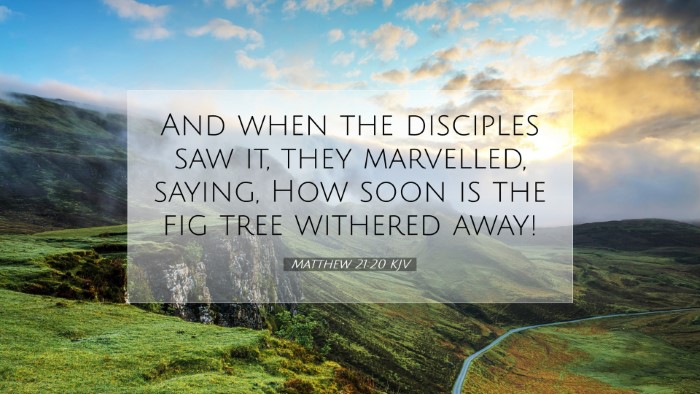Commentary on Matthew 21:20
Matthew 21:20 states, "And when the disciples saw it, they marveled, saying, How soon is the fig tree withered away!" This verse follows a remarkable event where Jesus curses a barren fig tree, which serves as a poignant symbol in His teaching about fruitfulness and judgment.
Contextual Analysis
This passage is situated in the context of Jesus' final week before His crucifixion. His actions and teachings are imbued with urgency and are directed toward conveying profound truths regarding the Kingdom of God.
Symbolism of the Fig Tree
The fig tree is rich in symbolism throughout Scripture. In the Old Testament, it often represents the nation of Israel (Hosea 9:10; Micah 7:1), and its barrenness signifies spiritual emptiness and failure to bear righteous fruit. Adam Clarke notes that Jesus’ cursing of the fig tree illustrates the judgment upon Israel for their lack of faith and disobedience.
The Response of the Disciples
Upon witnessing the withering of the fig tree, the disciples express their astonishment. Matthew Henry comments on their reaction, highlighting that their marveling reflects a deeper understanding of authority and divine power inherent in Christ. They begin to realize that Christ is not just a teacher but possesses sovereignty over nature itself.
Theological Implications
Matthew 21:20 leads us to profound theological reflections concerning faith, prayer, and the consequences of spiritual barrenness.
Faith and Its Power
Jesus' actions and the subsequent astonishment of the disciples serve to illuminate the power of faith. As Albert Barnes elaborates, this event signifies that faith is not just a passive belief but a dynamic force that can influence the natural world. The disciples are being instructed about the efficacy of prayer and faith when they later ask Jesus about the withered tree.
Faith as a Fundamental Principle
The discourse surrounding this miracle emphasizes the necessity of possessing genuine faith. Jesus goes on to declare the transformative power of faith saying, "If ye have faith, and doubt not," you will not only be able to do what was done to the fig tree but also to speak to mountains (Matthew 21:21). This illustration reinforces the idea that authentic faith can yield unbelievable outcomes.
The Role of Prayer
According to Matthew Henry, this incident calls attention to the nature of prayer. Prayer is presented as an essential component in both asking and receiving from God. When faith undergirds prayer, it opens the doors to divine possibilities. Emphasis is placed on praying with a heart aligned with God’s will.
Spiritual Barrenness
The cursing of the fig tree serves as a stark reminder of the dangers of being spiritually barren. Clarke points out that this event condemns hypocrisy—those who appear to have the knowledge of God but fail to produce good works. The warning extends to communities and churches that may be active outwardly but devoid of genuine spiritual fruit.
Application for Today's Believers
The implications of Matthew 21:20 challenge believers to reflect on their spiritual condition and the fruitfulness of their lives in Christ. The following applications can be drawn:
- Examine Personal Fruitfulness: Believers are encouraged to evaluate their lives regularly. Are they producing the fruits of the Spirit as outlined in Galatians 5:22-23? Spiritual health should be reflected through love, joy, peace, and other characteristics.
- Cultivate Faith: Emphasizing the importance of nurturing a sincere faith. Regular prayer, scripture reading, and community involvement are essential in strengthening one's faith.
- Engage in Prayer: Believers must recognize the significance and power of prayer in their lives. Formulating prayers that reflect both faith and the desire to align with God's will is vital.
- Embrace Accountability: Establishing accountability within Christian communities can foster growth and encourage focus on producing fruit conforming to God’s purpose.
Conclusion
In summary, Matthew 21:20, through the narrative of the withered fig tree, teaches believers about the seriousness of spiritual fruitfulness, the liberating and transformative power of faith and prayer, and the necessity for self-examination. The lesson laid out by Jesus in this event remains relevant, compelling Christians to pursue a vibrant faith that bears fruit for the Kingdom of God.


